 新闻详情
新闻详情
 新闻详情
新闻详情
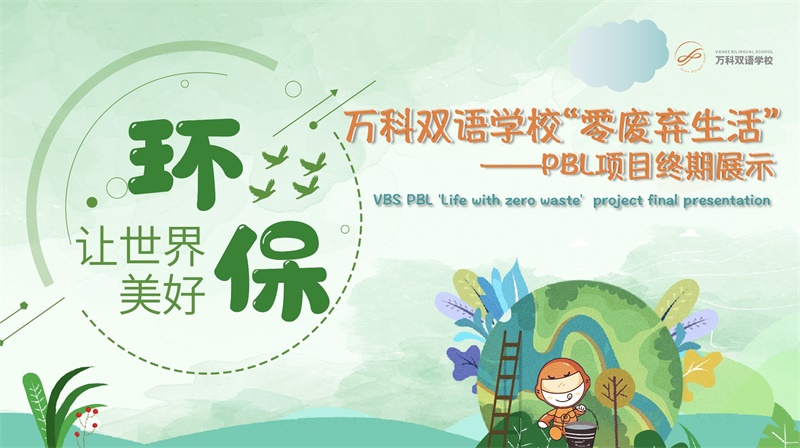
万双网讯 为给学生提供具有生活价值的学习,让学生从小树立环保意识、养成节约资源的好习惯,9月23日和30日,"环保——让世界美好"万科双语学校零废弃生活PBL项目终期展示分别在教室和学校剧场举行。二至六年级PBL项目小组的同学们进行了精彩展示。
VBS News Net: On September 23 and 30, the final presentation of the VBS PBL 'Life with zero waste' project was held in the classrooms and theater. The students from Grade 2 to Grade 6 PBL project team gave a wonderful presentation.
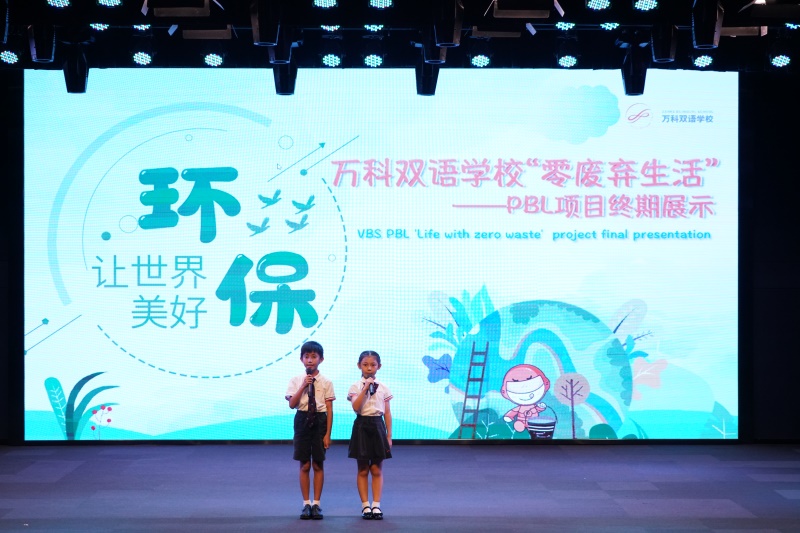
万科双语学校"零废弃生活"PBL项目于去年7月启动,经过一年的探索与实践,经历了项目入项、资料收集、调查研究、方案设计与实施、反思和迁移,本项目已接近尾声。终期展示分两个部分。9月23日,各年级PBL小组在教室进行了"画廊漫步"活动,完成了项目汇报。在众多项目小组中,每个年级遴选出优秀的小组,于9月30日在剧场面向全校师生展示。学校同时进行了现场直播。
The VBS PBL 'Life with zero waste' project was launched in July last year. After one year of exploration and practice, the project is coming to an end. The final presentation is divided into two parts. On September 23, PBL teams of all grades carried out the 'Gallery Walk' activity in the classroom and completed the project report. Excellent teams were selected from each grade and presented to all teachers and students in the theater on September 30. The school also conducted a live broadcast.
二年级:白板笔的回收和创意利用
Grade 2: recycling and creative utilization of whiteboard pens
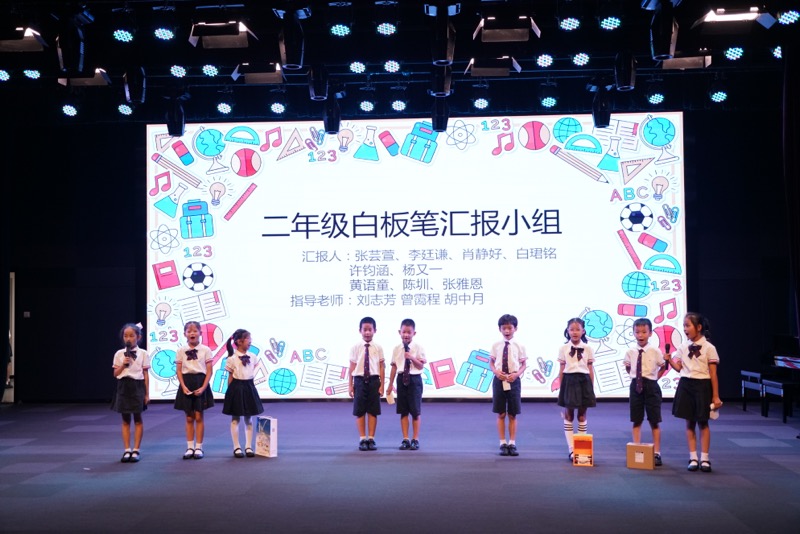
二年级学生研究的主题是"白板笔的回收和创意利用"。同学们设计了宣传海报,访谈了校园的老师和同学,设计了白板笔使用数量问卷,访谈了后勤职工白板笔的发放情况,设计了白板笔游戏,制作了白板笔游戏规则海报,还设计了温馨提示语——"小笔戴帽,寿命更长"。同学们在国旗下对全校师生进行宣讲,以情景剧的形式进行了中期展示,让温馨提示语走进校园的每一间教室。
The theme of Grade 2 students' research is recycling and creative utilization of whiteboard pens. The students designed posters, interviewed teachers and students on campus, designed a questionnaire on the use of whiteboard pens, designed whiteboard pen games, made posters of whiteboard pen game rules, and designed a warm reminder. The students gave lectures to the teachers and students under the national flag and made a mid-term presentation.
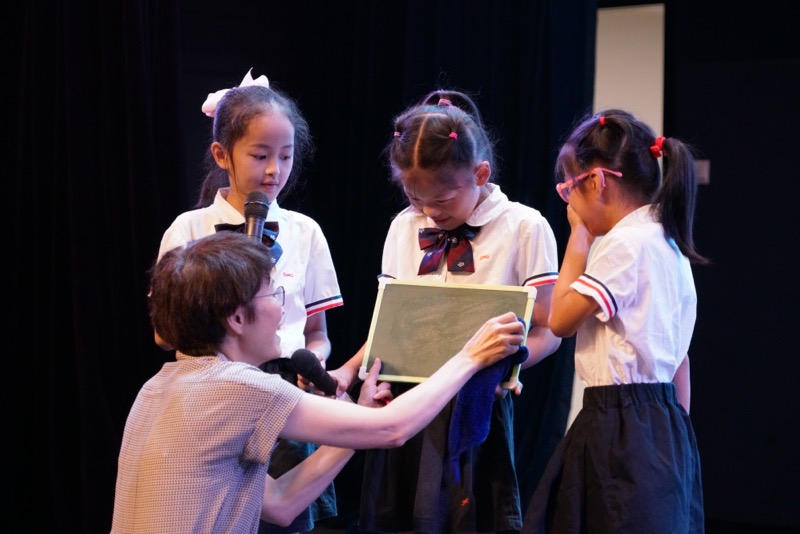
成果:通过反复实践和对比,同学们设计了智能白板笔回收箱,比较了一次性白板笔和可加墨白板笔,最后推荐学校使用墨囊白板笔和无尘粉笔。
Results: the students designed the intelligent whiteboard pen recycling box, compared the disposable whiteboard pen and whiteboard pen capable of adding ink, and finally recommended the school to use ink bag whiteboard pen and dust-free chalk.
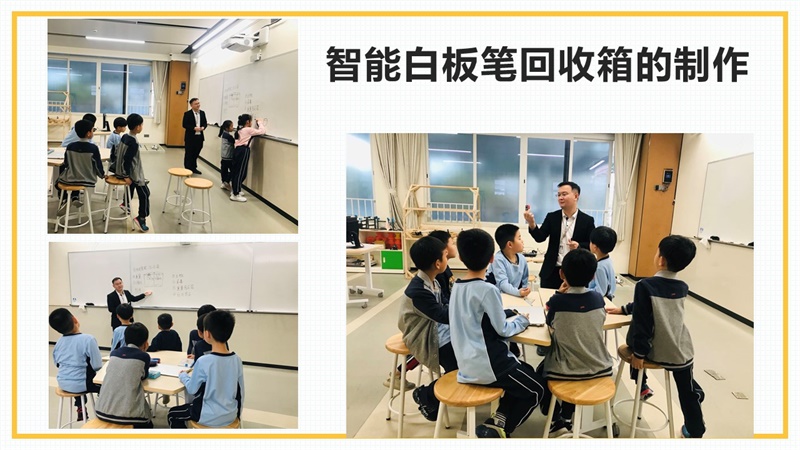
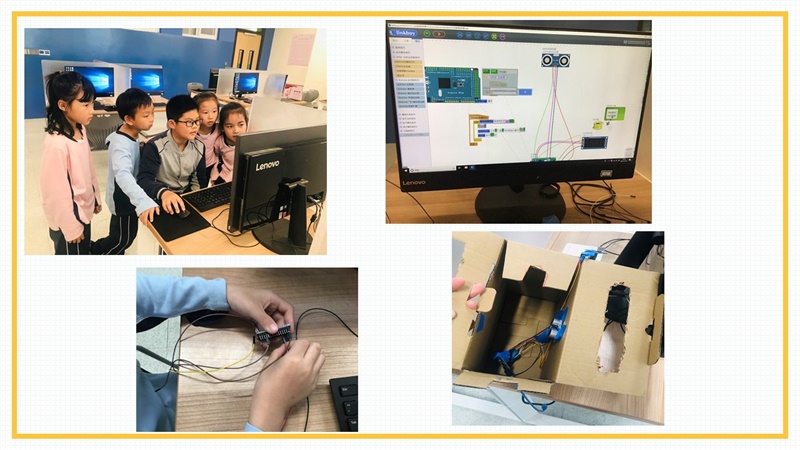
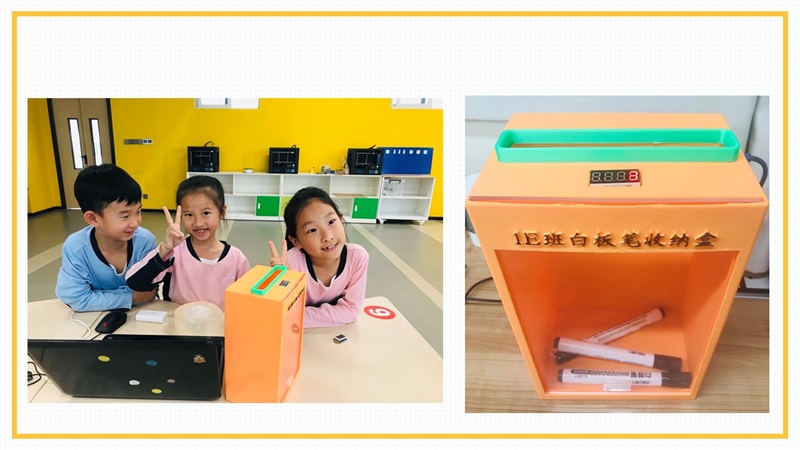
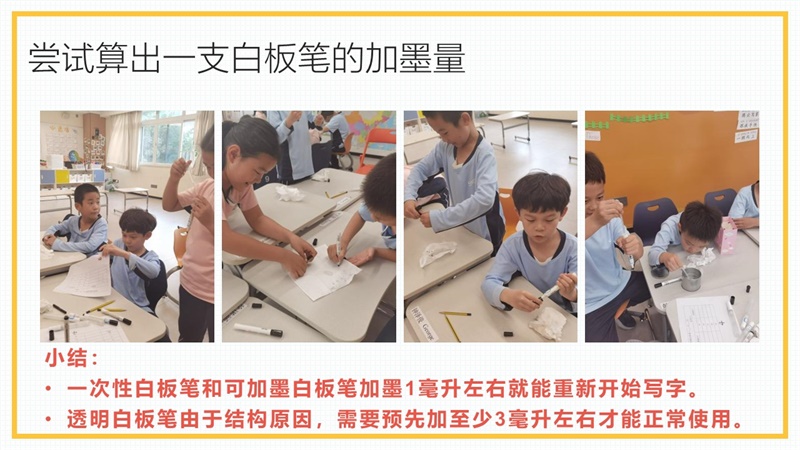
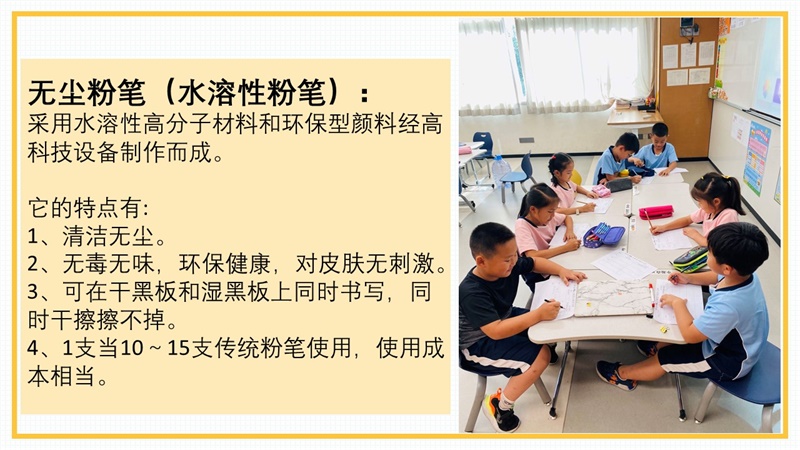
收获:在项目式学习中,学生们学会了时间管理,学会了进行项目规划和反思,收获了团队精神、创新精神,还锻炼了自己的表达能力。
Gains: in project-based learning, students learned time management, project planning, and reflection, gained team spirit and innovative spirit, and improved their expression ability.
三年级:白板笔与塑料瓶的零废弃研究
Grade 3: Research on zero waste of whiteboard pen and plastic bottle
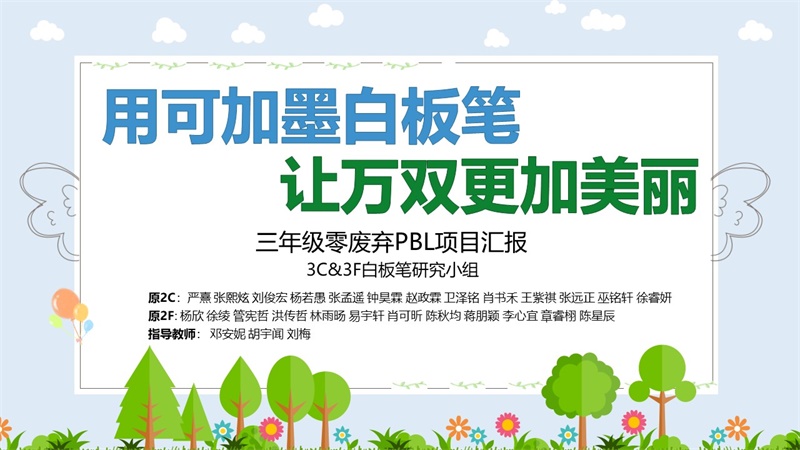
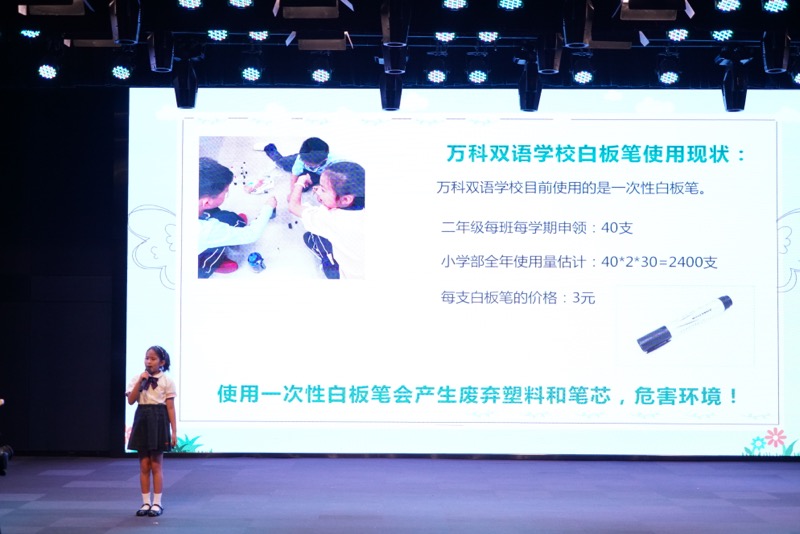
三年级学生研究的主题是校园白板笔和塑料瓶的零废弃研究。学生们设计了六个研究方向。1、通过给白板笔加墨的方式减少废弃白板笔,从而实现白板笔的零废弃。2、制作白板笔提醒器。3、设计校园废弃白板笔回收方案。4、制作植物墙,废弃塑料瓶再利用。5、优化废弃塑料瓶的回收路径。6、设计废弃塑料瓶宣传墙。
The Grade 3 students' research theme is the zero waste of whiteboard pens and plastic bottles. The students designed six research directions. 1. Reduce waste whiteboard pens by adding ink to whiteboard pens. 2. Make a whiteboard pen reminder. 3. Design the recycling scheme of waste whiteboard pens on campus. 4. Make plant walls and reuse waste plastic bottles. 5. Optimize the recycling path of waste plastic bottles. 6. Design waste plastic bottle publicity wall.
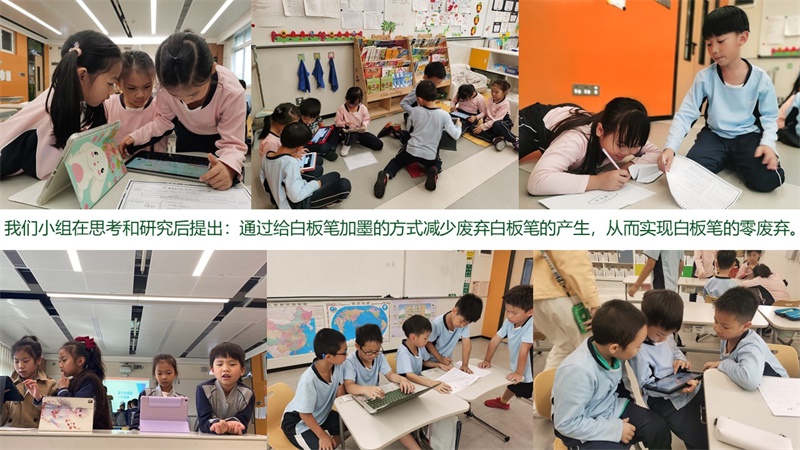
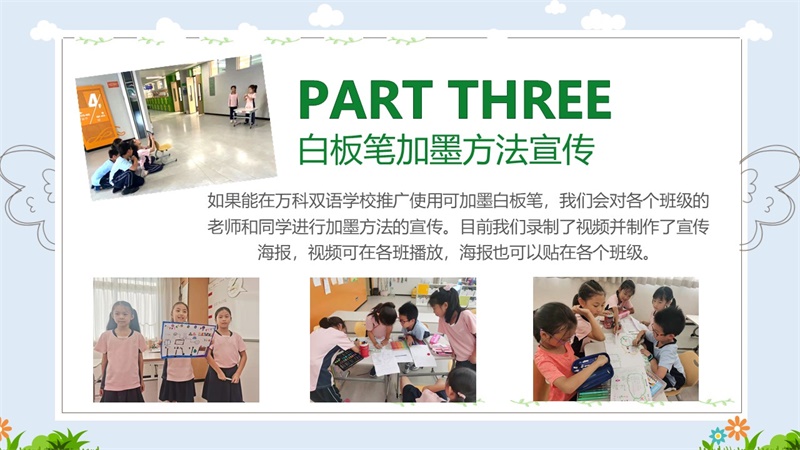
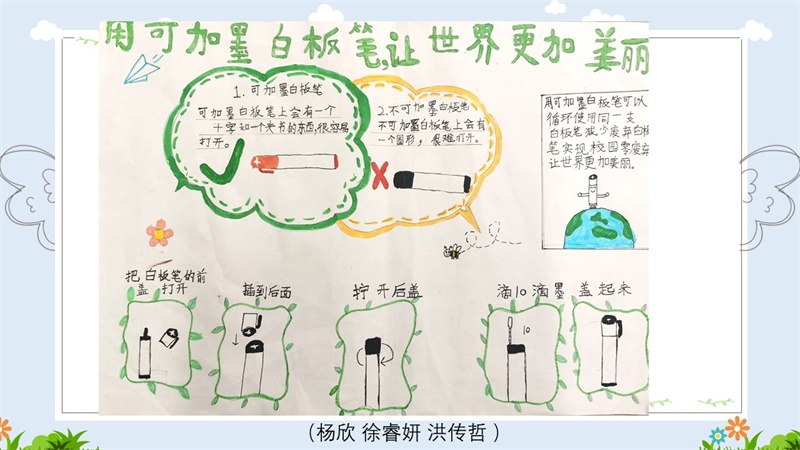
成果:掌握白板笔加墨方法,并推荐使用。
Results: master the inking method of the whiteboard pen.
收获:树立了环保意识,同时也掌握了采访、问卷调查、实地调研、收集资料、制作ppt、演讲等基础技能,同时加强了学生的合作精神、提升了学生的创新思维能力。
Gains: Students have established awareness of environmental protection, mastered basic skills such as interview, questionnaire survey, field research, data collection, making PPT, and speech, strengthened their cooperative spirit, and improved their creative thinking ability.
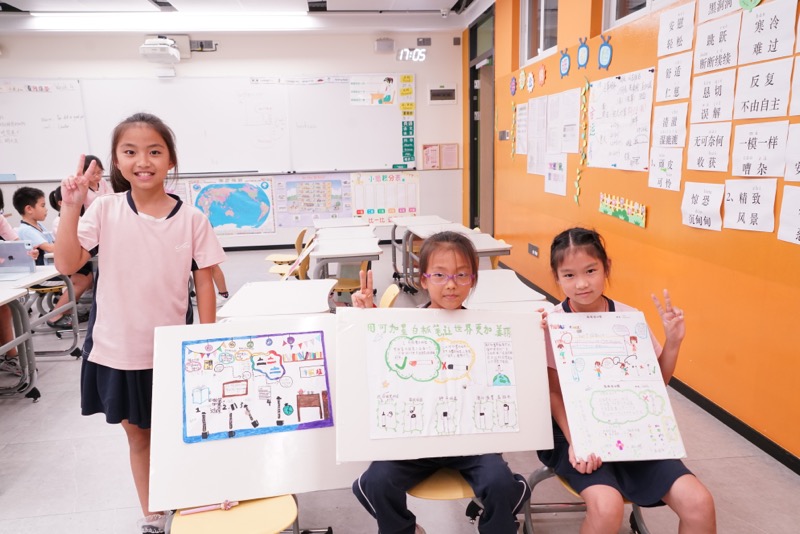
四年级:校园农场研究
Grade 4: Research on the farm inside the campus
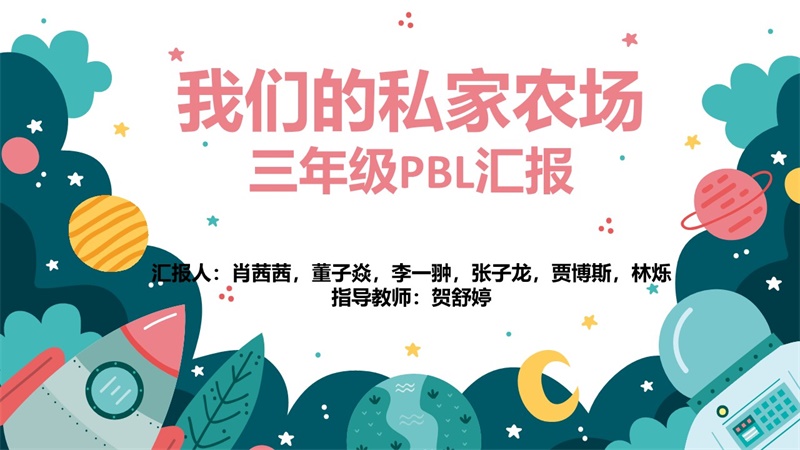
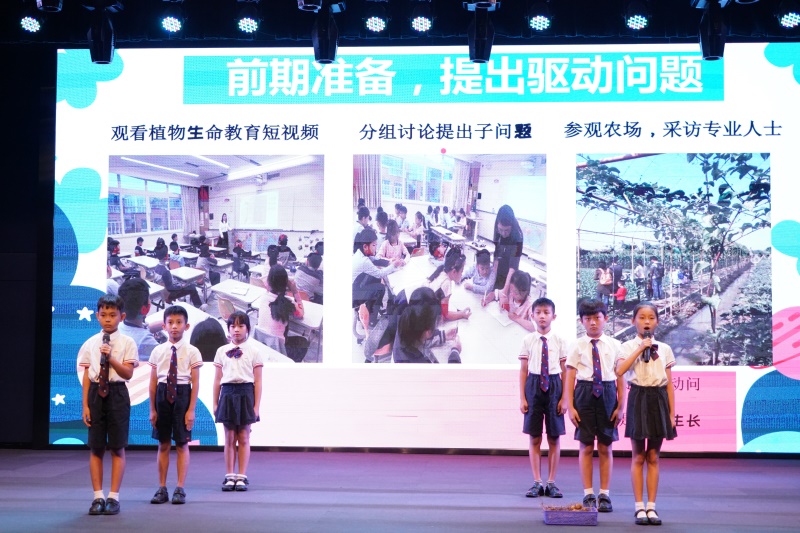
四年级学生研究的主题是校园农场。学生们纷纷变成VBS小农夫,投入VBS校园农场的建设中。项目初期各班小组成员集体观看了关于土壤、种植、堆肥等科普视频,并实地对本班的种植区域进行了规划,利用上网查资料结合深圳的天气、校园的土质、植物生长的需求进行筛选,最终确定了本班种植的植物。随后进行堆肥、播种、移栽、浇水驱虫、记录成长、菜地维护等实践。
The theme of Grade 4 students' research is the farm inside the campus. Students have become VBS small farmers. At the beginning of the project, the team members of each class watched the videos about soil, planting, and composting, arranged the planting area, checked the weather in Shenzhen, the soil quality of the campus and the needs of plant growth, and finally made decisions on the plants planted in the class. Then students compost, sow, transplant, water, expel insects, record growth, and maintain vegetable fields.
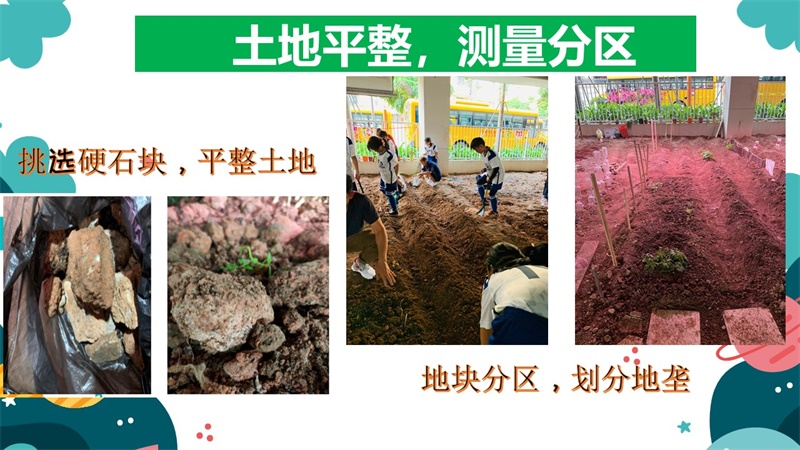
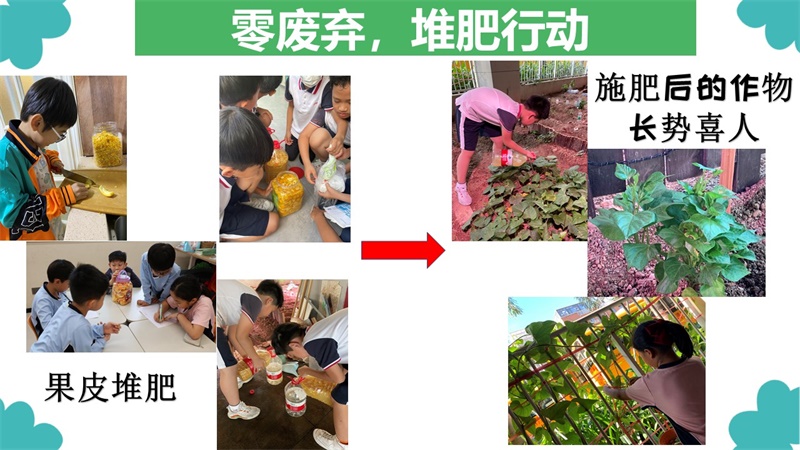
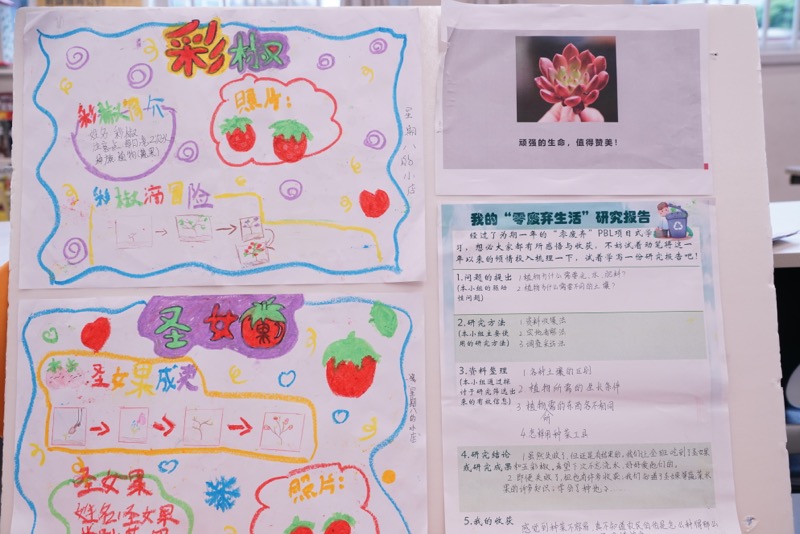
成果:4C班的土豆长势喜人,4D班的S型菜地极具艺术性,4E班的指示牌色彩明丽、功能明确,4F班的藤蔓植物生机勃勃,4G班的小白菜苍翠欲滴,4I班柑橘和小番茄可口诱人,4O班辣椒收获颇丰,4V班红薯苗欣欣向荣。
Results: the potatoes in 4C are growing well. The S-shaped vegetable field in 4D is very artistic. The signs in 4E are bright in color and clear in function. The vines in 4F are vibrant, the cabbages in 4G are green. The oranges and small tomatoes in 4I are delicious. The peppers in 4O are abundant, and the sweet potato seedlings in 4V are thriving.
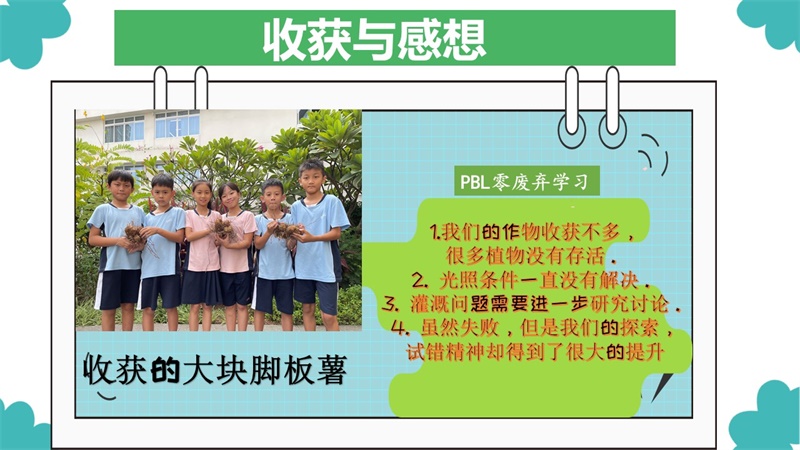
收获:经历了种植试错,学生变为主动的探索者,收获了植物种植知识,提高了团队协作能力,能够在反思的基础上对自己的项目进行迭代更新。
Gains: students become explorers, gain planting knowledge, and improve team cooperation ability.
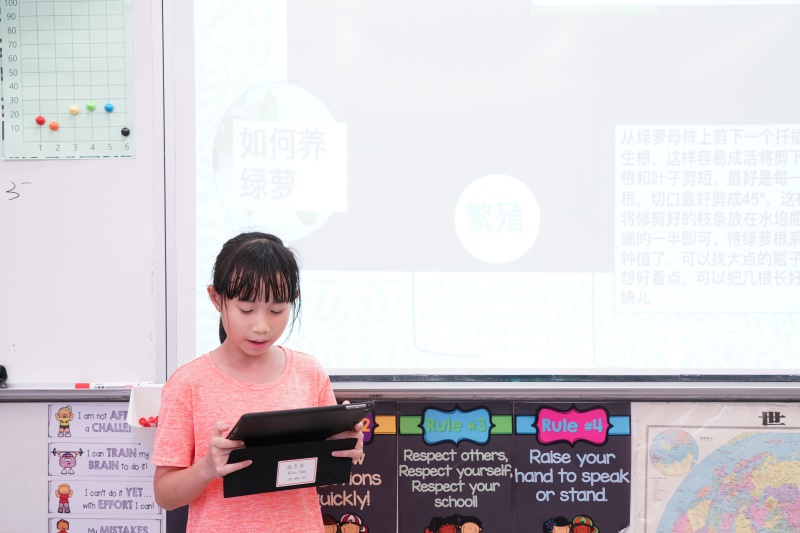
五年级:垃圾分类情况研究
Grade 5: Study on garbage classification
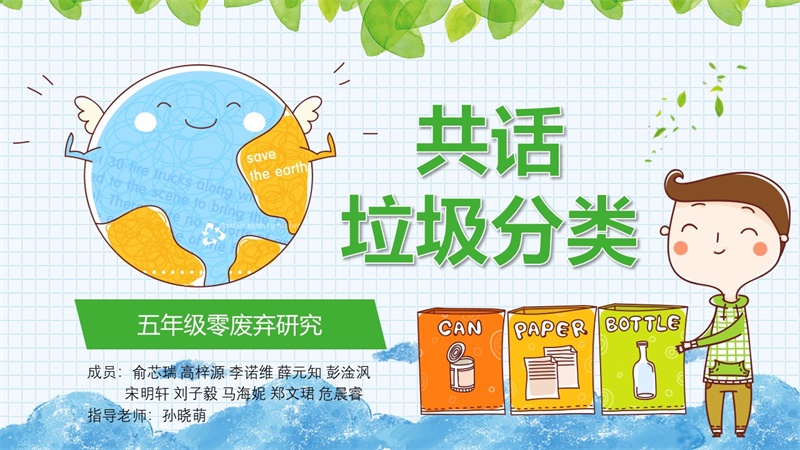
五年级研究的主题是校园垃圾分类情况及垃圾桶设置合理性。学生们设计了社区、学校垃圾分类实施情况问卷,调查了校园内垃圾分类的现状,访谈了社区内的居民、校内老师。通过数据分析,启动研究计划。
The Grade 5 students' research theme is the classification of campus garbage and The rationality of the setting of trash cans. The students designed a questionnaire on implementing waste classification in communities and schools, investigated the current situation of waste classification on campus, and interviewed residents and teachers in the community.
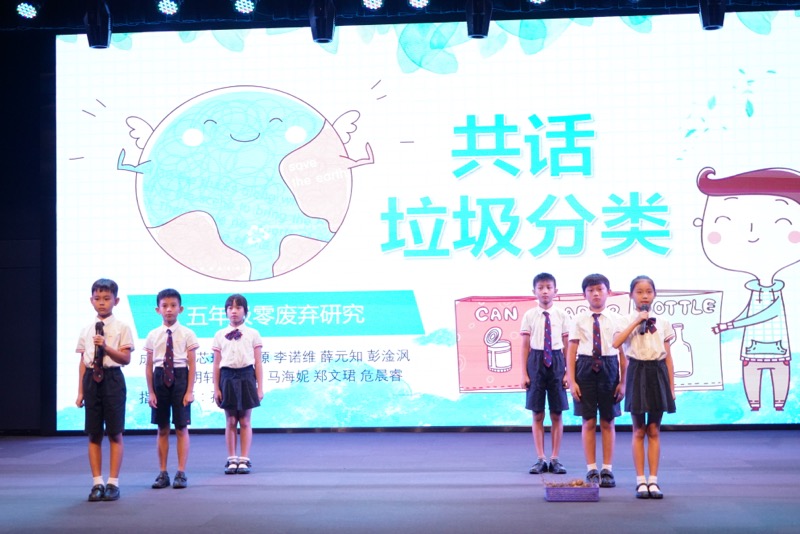
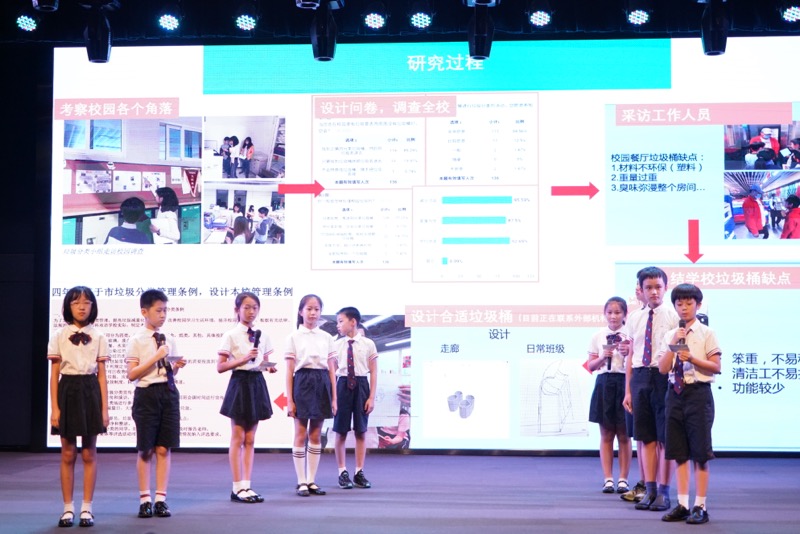
成果:5C同学设计了"零废弃"具体操作流程,宣讲了本校的垃圾分类管理条例,并群策群力制作了两个更符合校园使用、更环保的垃圾桶。5D班同学制定了《万科双语学校生活垃圾分类条例》,设计了万科双语学校垃圾分类Logo。
Results: 5C students designed the specific operation process of zero waste, publicized our school's garbage classification management regulations. They made two more environmentally friendly garbage cans that are more suitable for campus use. The students of 5D formulated the regulations on domestic waste classification of VBS and designed the waste classification logo of VBS.
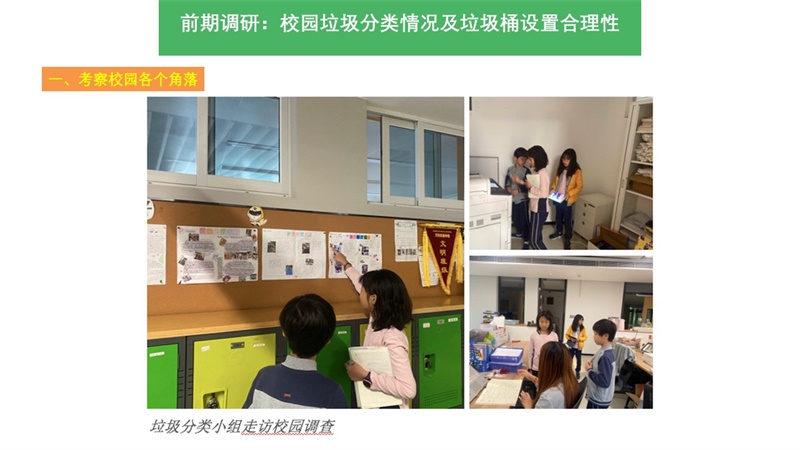
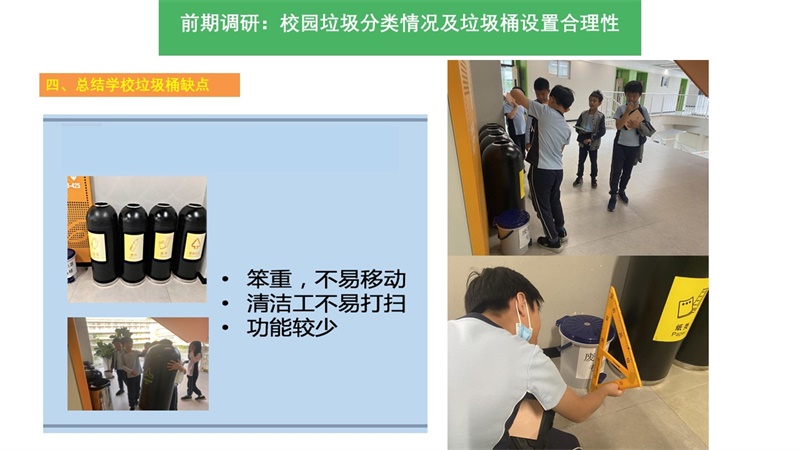
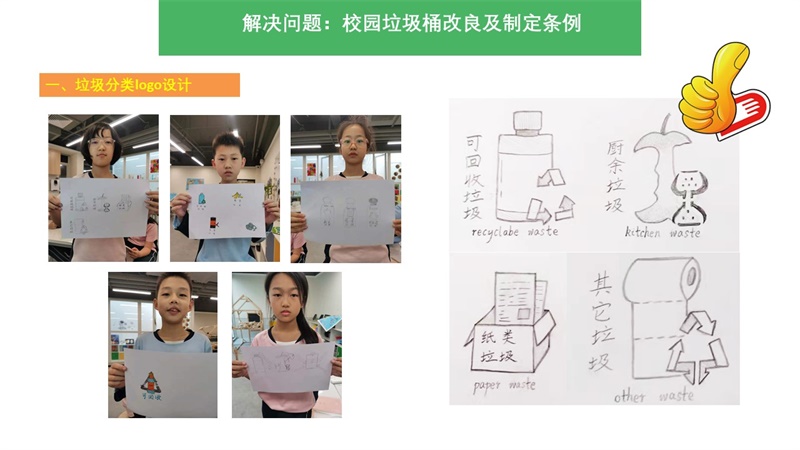
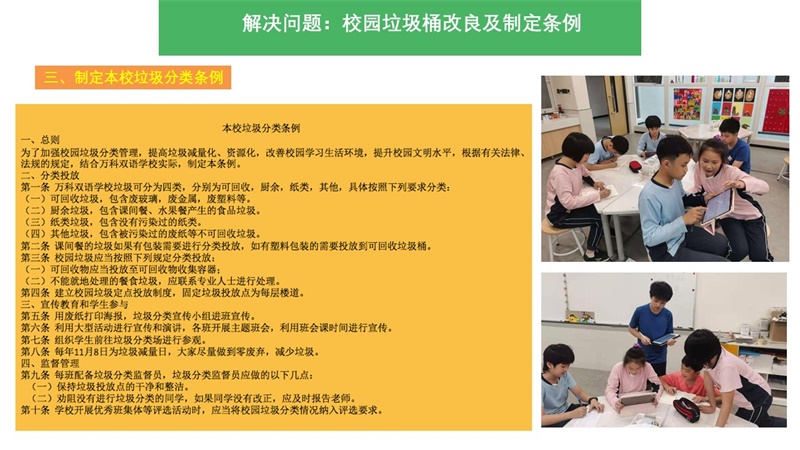
收获:通过此次项目实践,学生收获了合作、探索、共赢,也真正领悟了"零废弃"这种人与自然和谐相处的生活方式。
Gains: students understood that life with zero waste was harmonious coexistence between humans and nature.
六年级:废纸的回收与再利用
Grade 6: recycling and reuse of waste paper
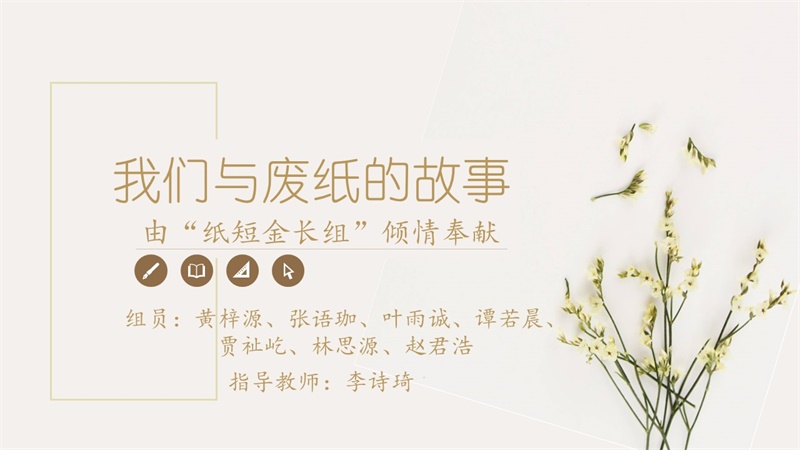
六年级学生研究的主题是"废纸的回收与再利用"。在研究过程中,学生参加了万科基金会发起的"零废弃"讲座,观看了手工造纸的纪录片,了解工厂制纸的过程,同时走访校园,采访中外教师,记录了VBS校园产生废纸的情况、关于废纸回收的建议,调查了各个教室如何处理废纸。最终决定两个研究方向:一是将废纸再回收,制成全新的再生纸;二是将废纸回收售卖,将废纸变为"真金白银"。
The theme of Grade 6 students' research is recycling and reuse of waste paper. During the research, the students participated in the lecture on zero waste sponsored by Vanke Foundation, watched the documentary on manual papermaking, learned the process of factory paper making, interviewed Chinese and foreign teachers, and recorded the waste paper produced in VBS campus and suggestions on waste paper recycling. Finally, two research directions are decided: firstly, recycle the waste papers to make new recycled papers. Secondly, recycle and sell waste papers.
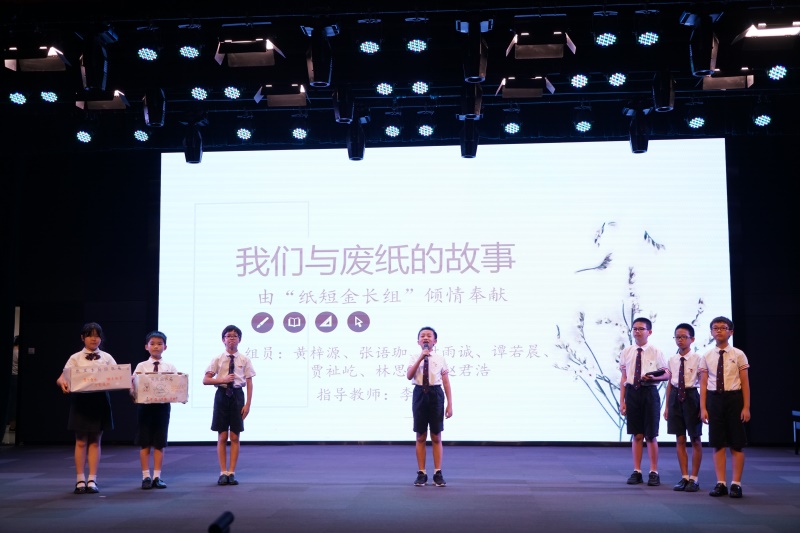
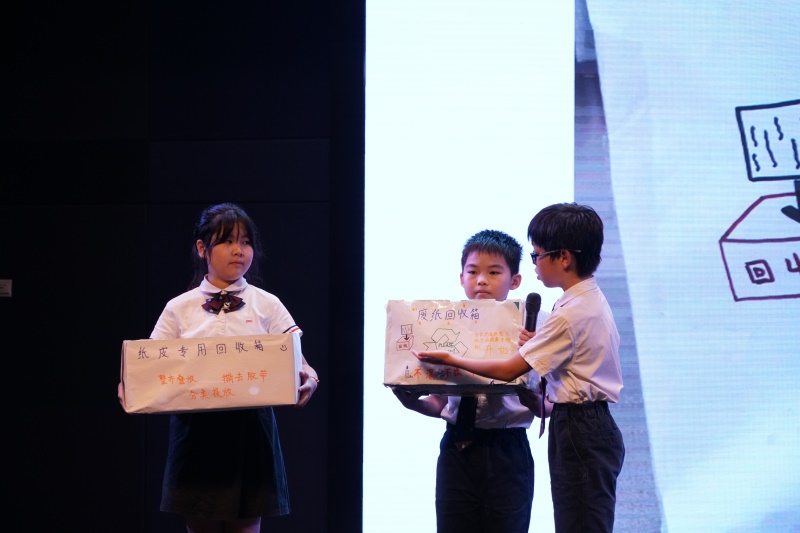
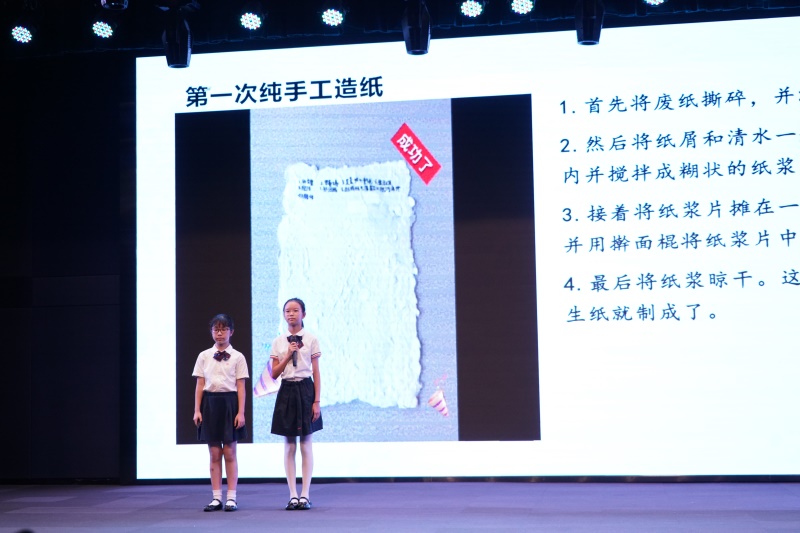
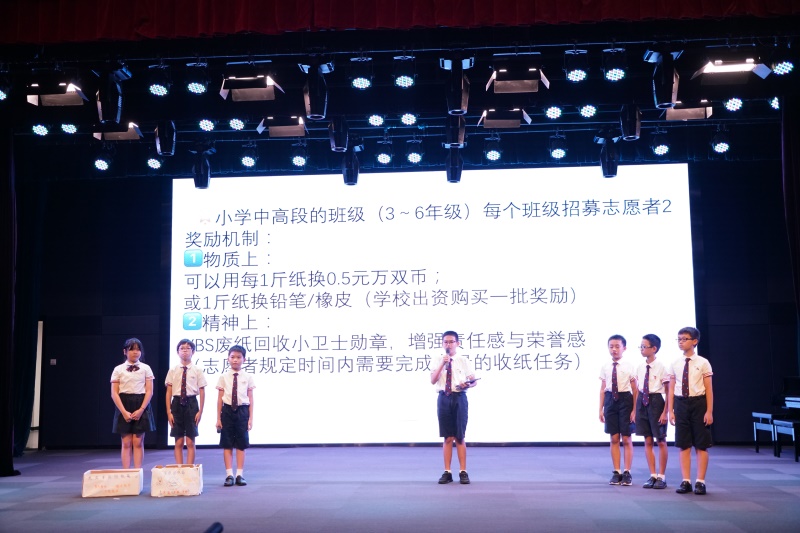
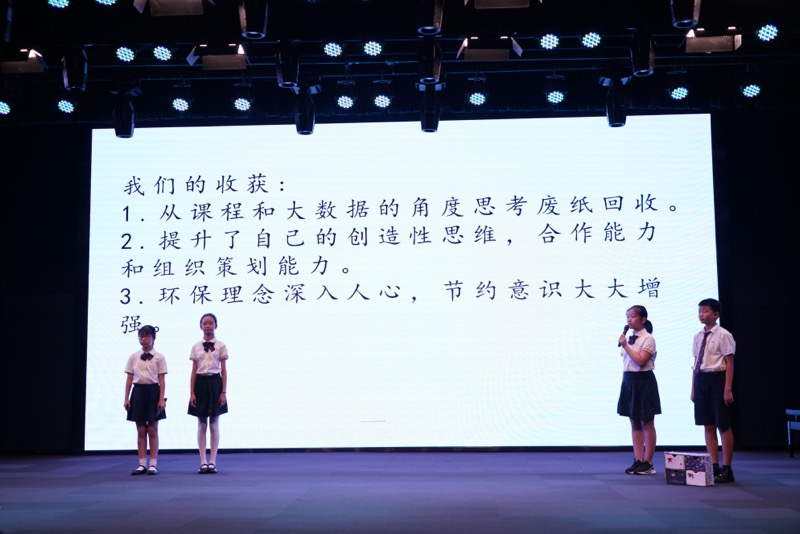
成果:制作了废纸回收箱,设计了绿色节约用纸宣传海报,用废纸制作了国际象棋、小台灯、水火箭、收纳柜等作品,贩卖废纸收获近600元,能购买一台小型碎纸机。
Results: Students learned how to make paper, made waste paper recycling boxes, designed posters, made chess, small desk lamps, water rockets, and storage cabinets with waste paper, sold waste paper, and gained nearly 600 yuan. Students can buy a small paper shredder.
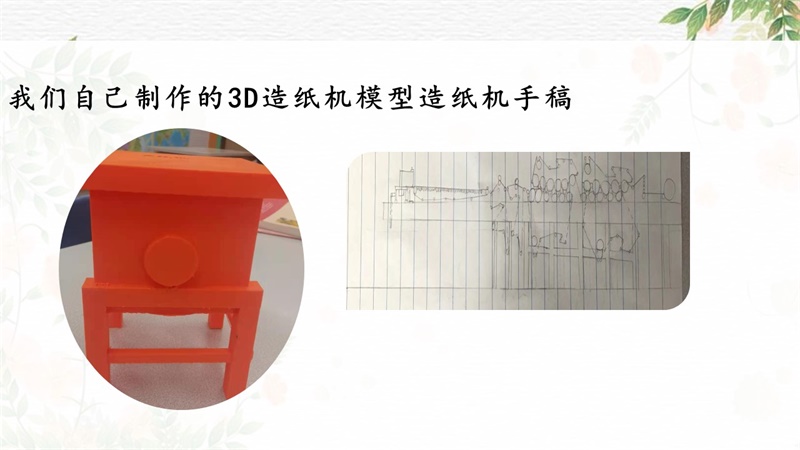
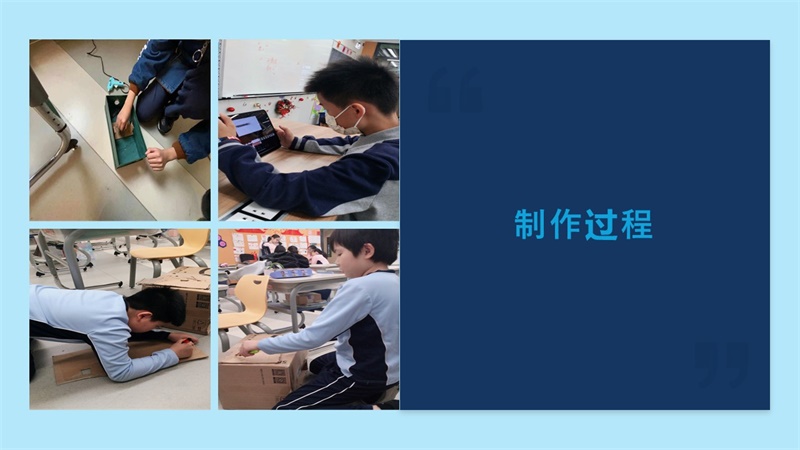


收获:学会利用大数据收集学校废纸的处理情况,初步掌握了数据的收集与筛选、分析的能力,提高了团队协作能力,有了社会责任感,将节约用纸的环保理念深入人心,对任何事情的处理有了思辨性。
Gains: students learned to use big data to collect the disposal of school waste paper, mastered the ability of data collection, improved the ability of teamwork, and learned to deal with problems with speculative thinking.
PBL,Project -Based Learning,项目式学习,以解决具有现实意义的问题为目的导向,通过提出问题、规划方案、解决问题、评价反思等几个环节,让学生从被动接受者,变为主动探索者。PBL是以问题为导向的教学方法,是基于现实世界的以学生为中心的教育方式。万科双语学校将PBL 项目式学习列入课表,全体学生参与,更深层次影响孩子们的学习动机,提升他们将知识应用于实际的能力,使其具有 21 世纪学生核心素养:文化理解与传承、审辩思维、创新、沟通、合作,更好地站在未来中央。
PBL, project-based learning, aims to solve problems of practical significance and enable students to change from recipients to explorers by raising problems, solving problems, evaluating, and reflecting. PBL is a problem-oriented teaching method and a student-centered education method based on the real world. VBS offers PBL courses with the participation of all students, which will further affect children's learning motivation, improve their ability to apply knowledge to practice, and make them have the core qualities of students in the 21st century, letting them experience the future.
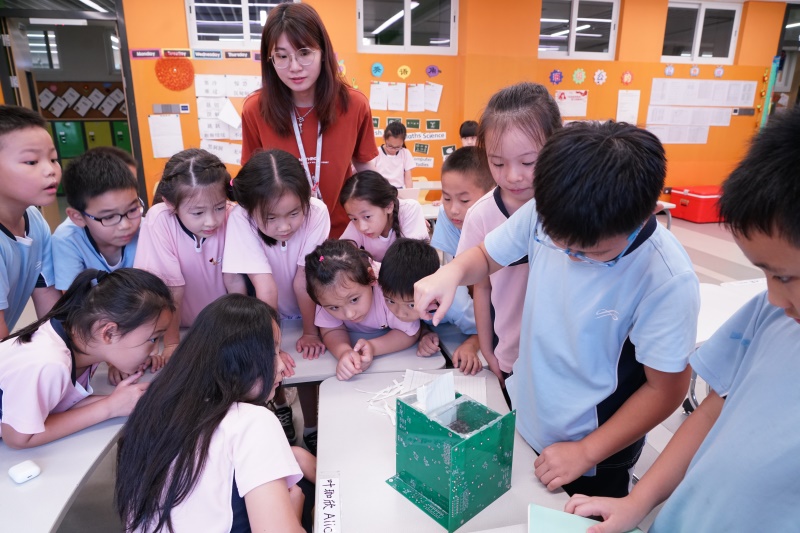
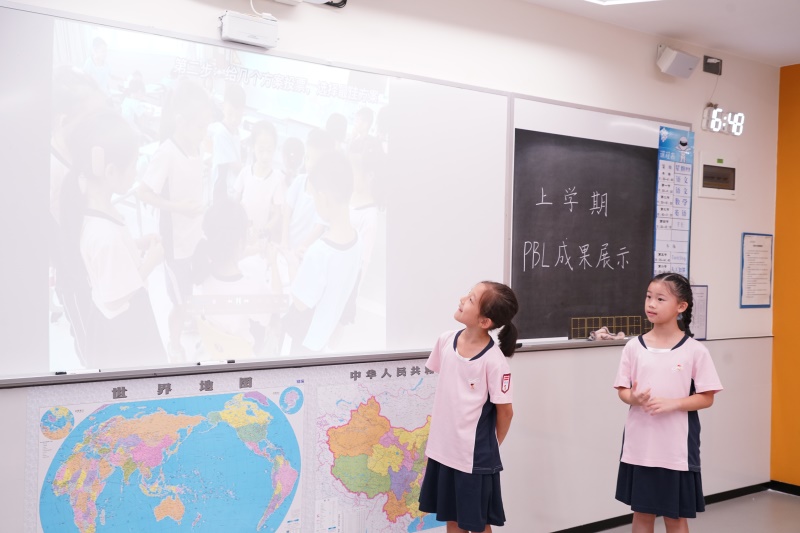
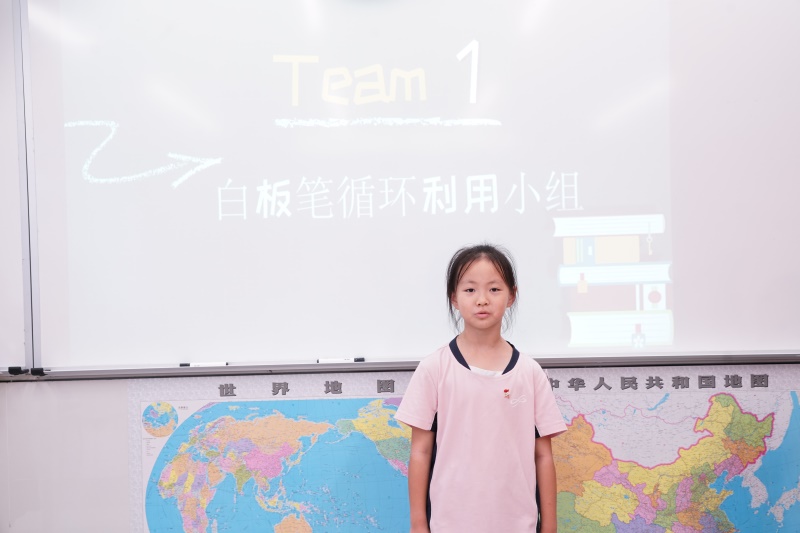
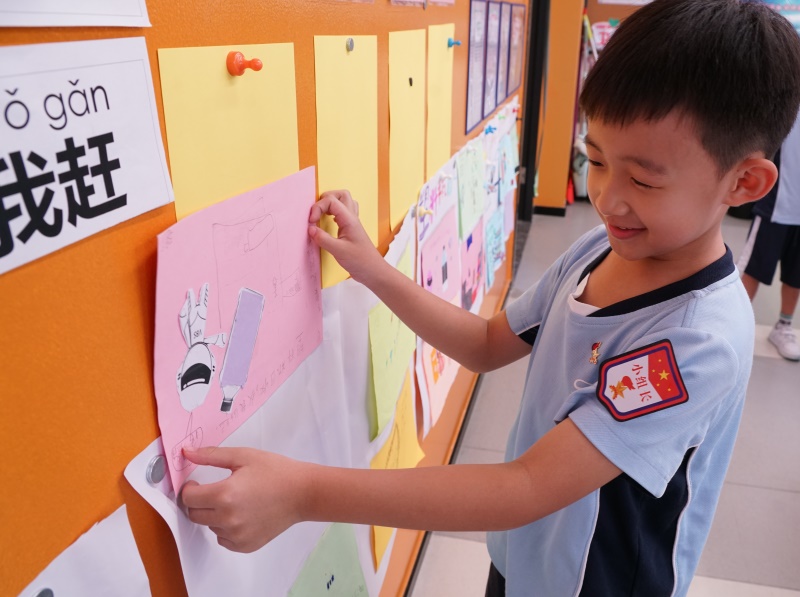
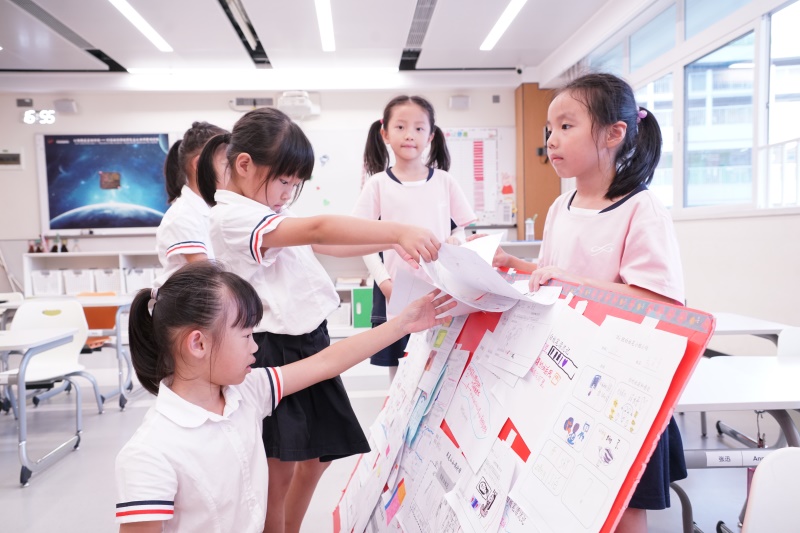
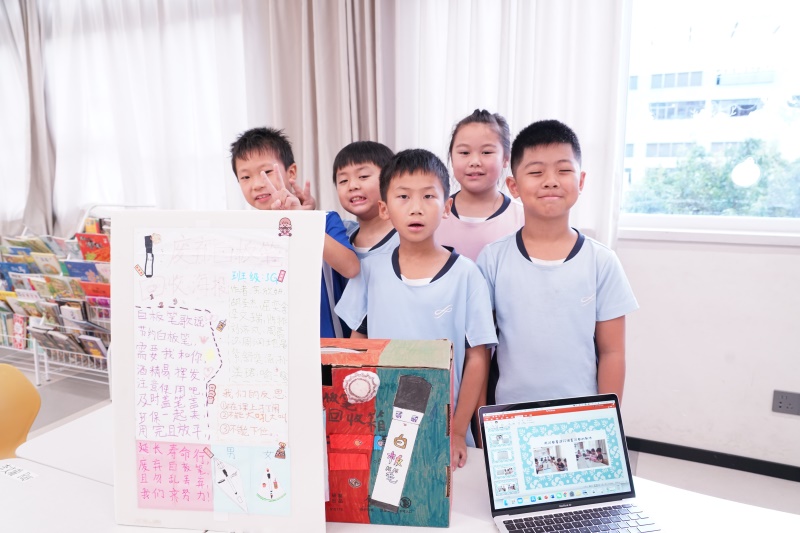
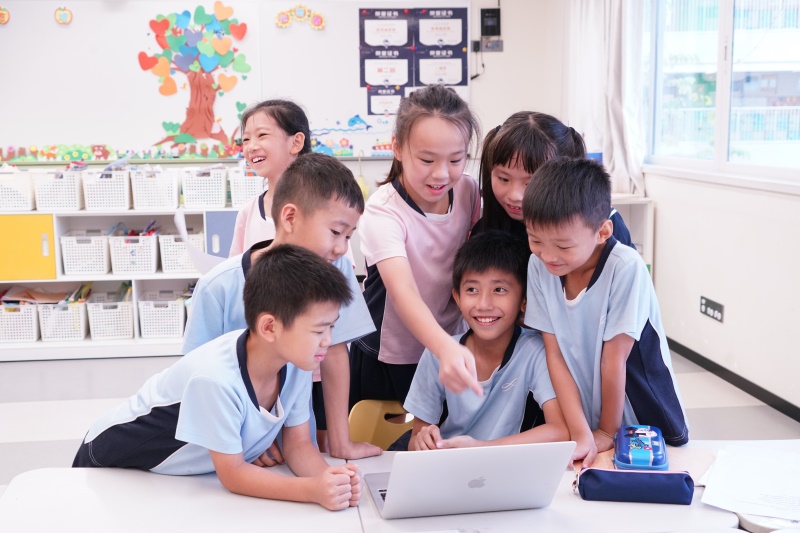
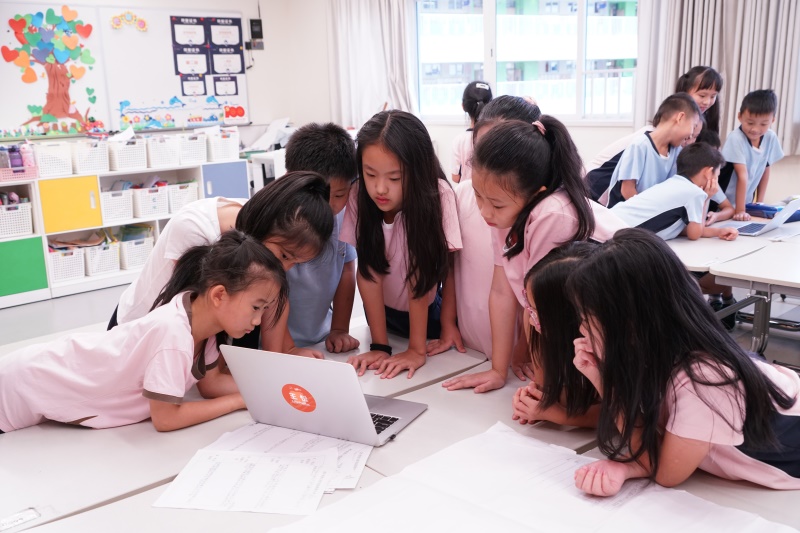
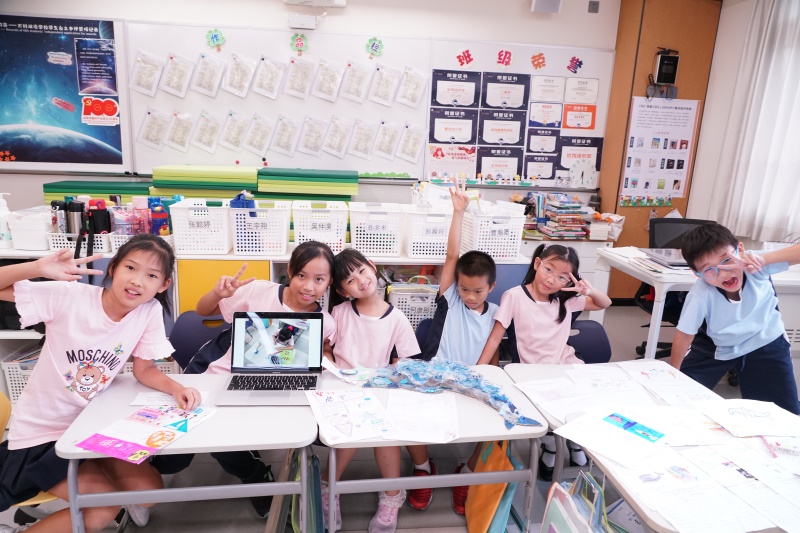
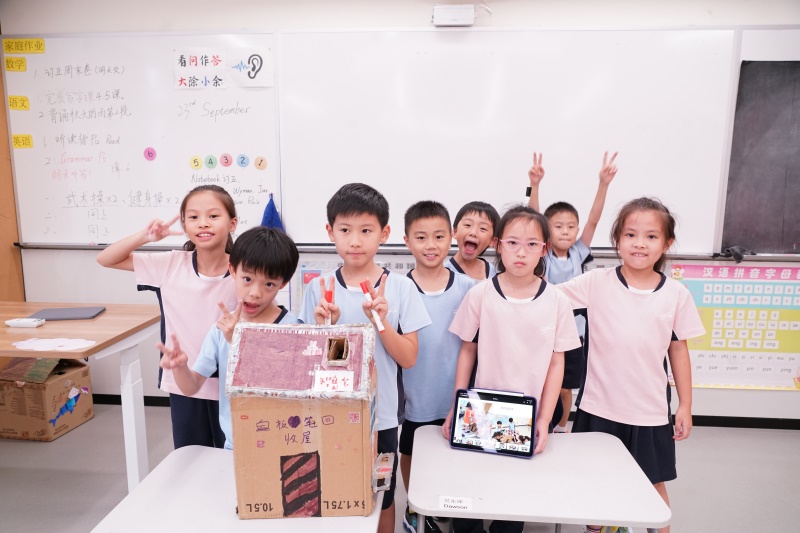
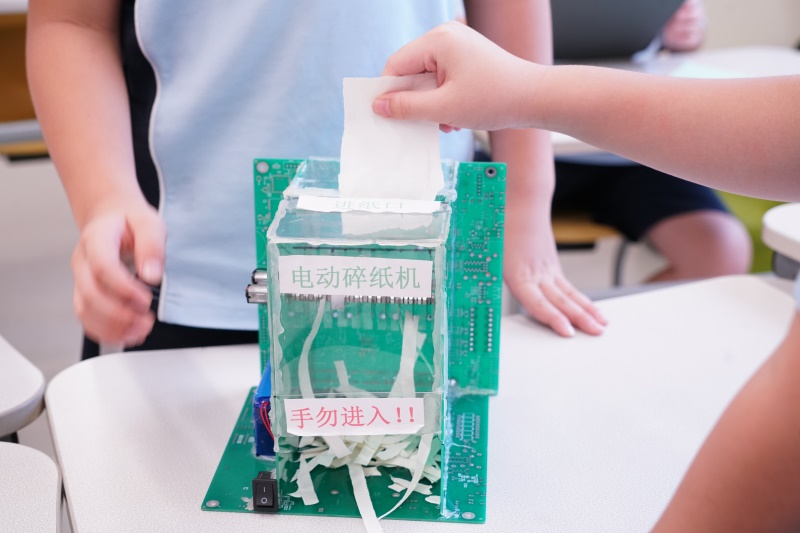
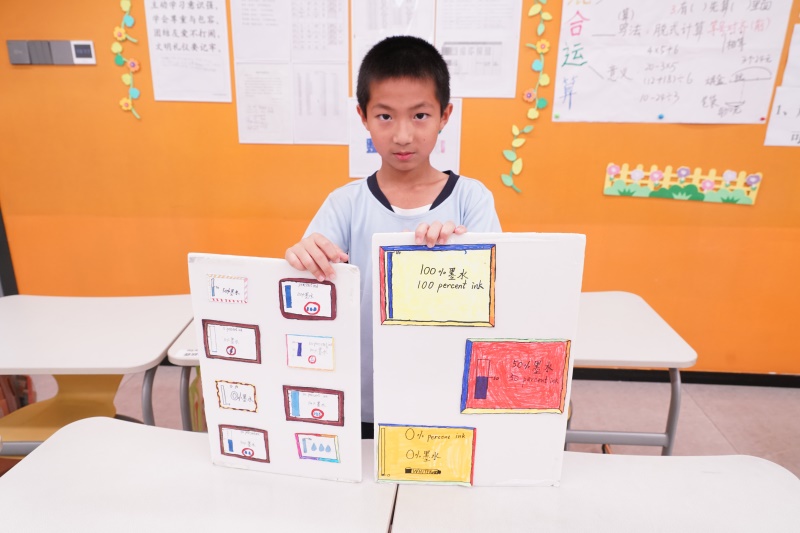
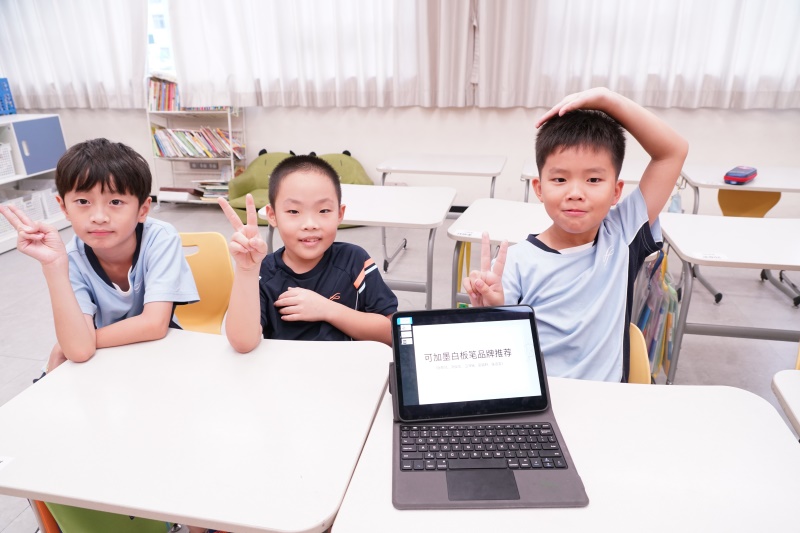
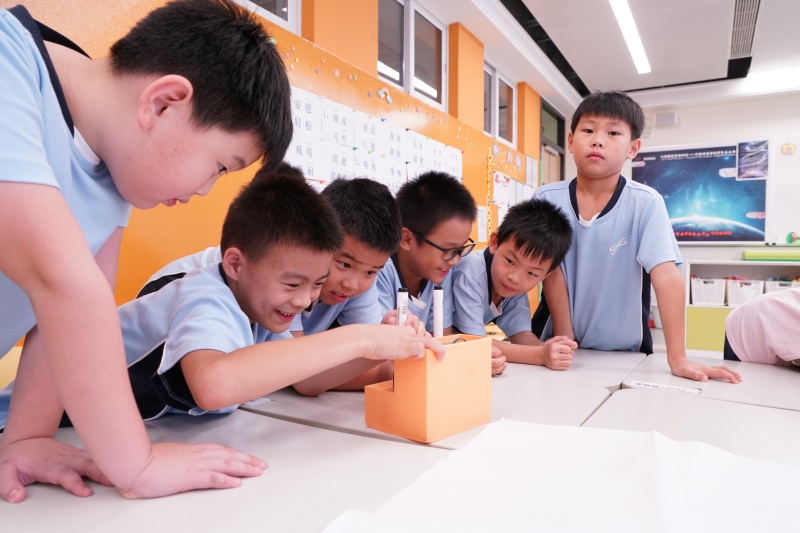
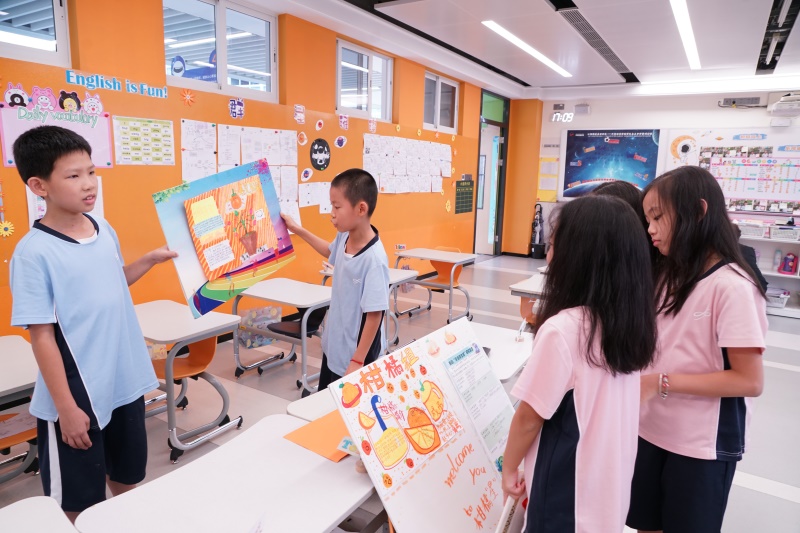
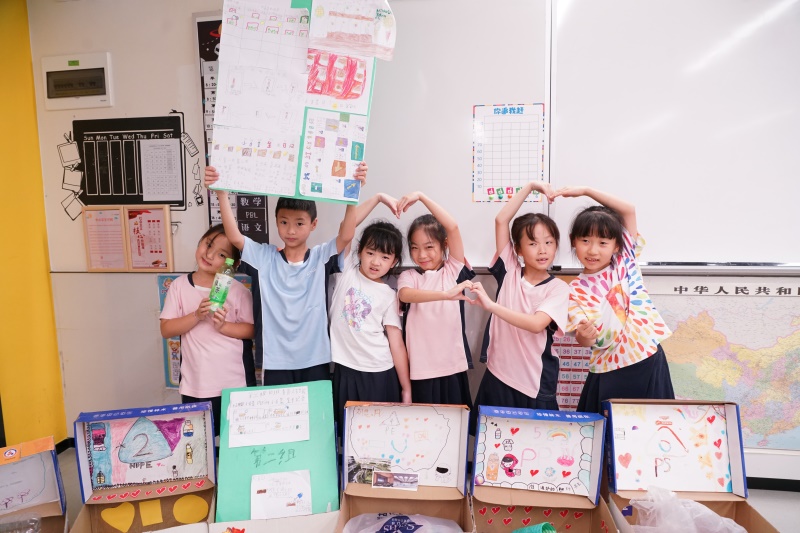
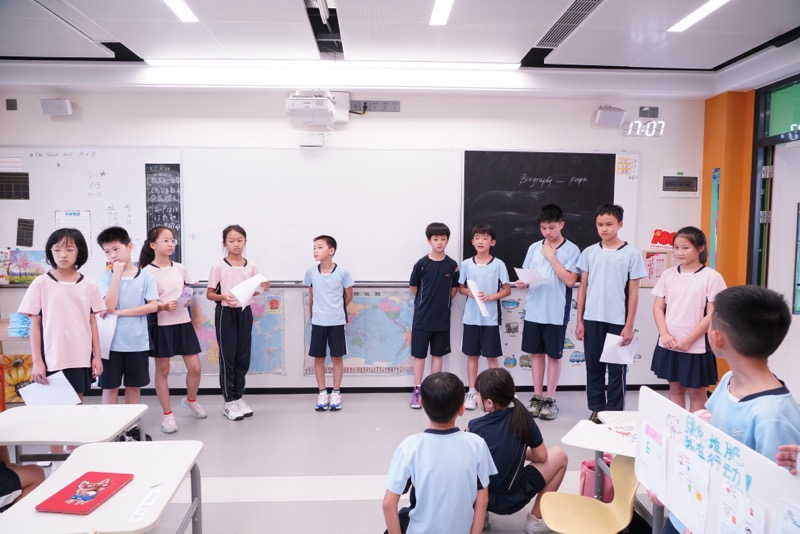
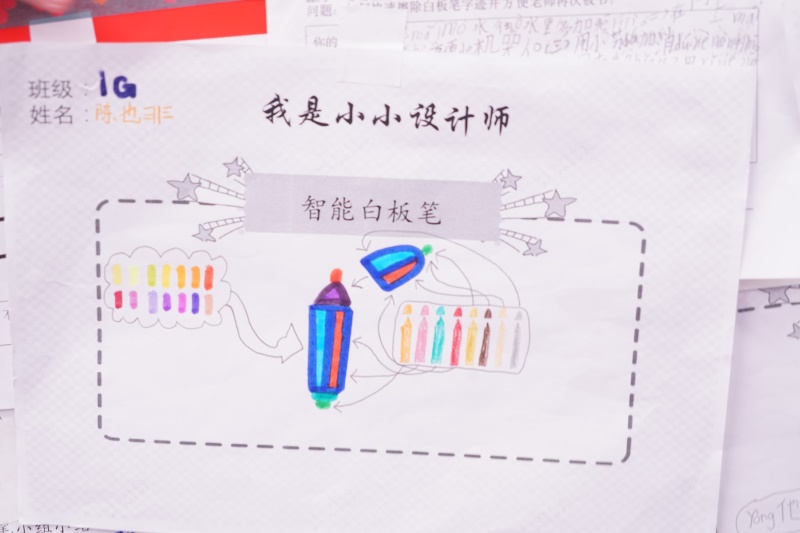
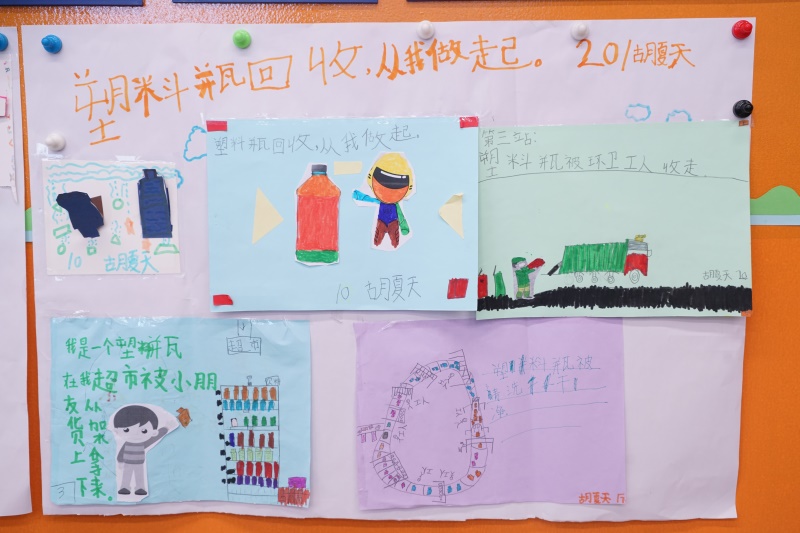
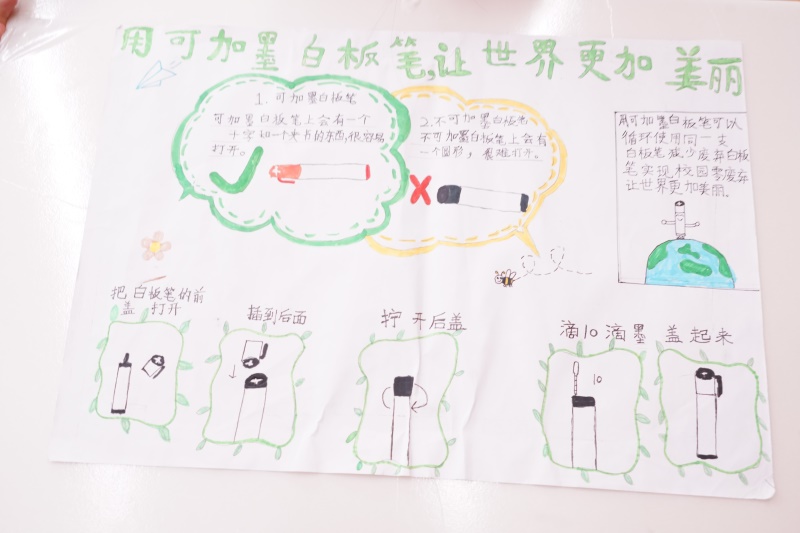
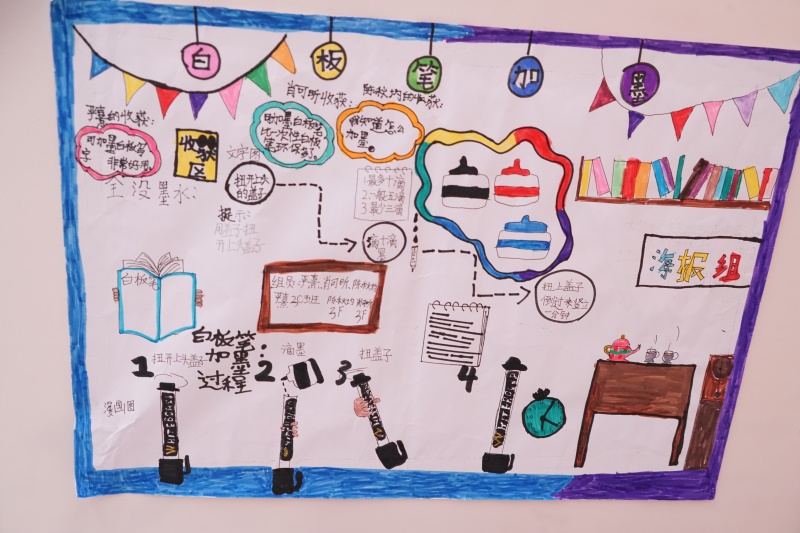
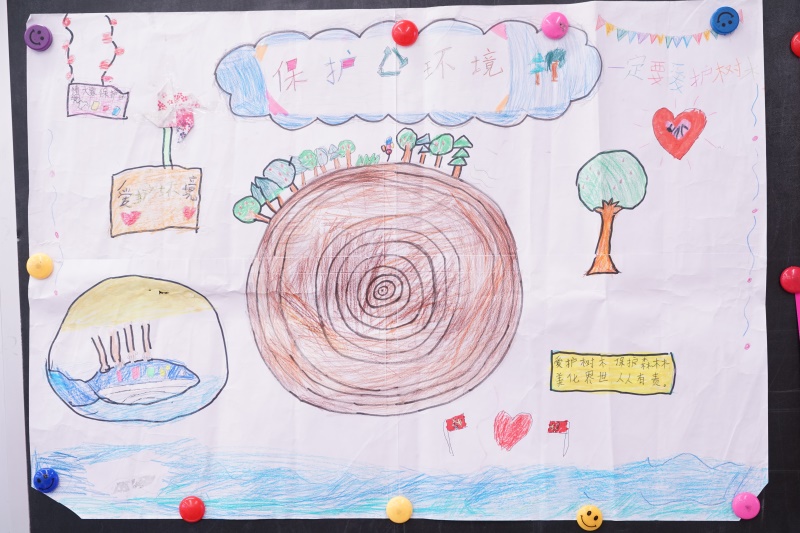
编辑/燕子
翻译/晓冬
视频/侯亮
Edited by Linda
Translated by Reny
Video by Leon

万双网讯 为给学生提供具有生活价值的学习,让学生从小树立环保意识、养成节约资源的好习惯,9月23日和30日,"环保——让世界美好"万科双语学校零废弃生活PBL项目终期展示分别在教室和学校剧场举行。二至六年级PBL项目小组的同学们进行了精彩展示。
VBS News Net: On September 23 and 30, the final presentation of the VBS PBL 'Life with zero waste' project was held in the classrooms and theater. The students from Grade 2 to Grade 6 PBL project team gave a wonderful presentation.

万科双语学校"零废弃生活"PBL项目于去年7月启动,经过一年的探索与实践,经历了项目入项、资料收集、调查研究、方案设计与实施、反思和迁移,本项目已接近尾声。终期展示分两个部分。9月23日,各年级PBL小组在教室进行了"画廊漫步"活动,完成了项目汇报。在众多项目小组中,每个年级遴选出优秀的小组,于9月30日在剧场面向全校师生展示。学校同时进行了现场直播。
The VBS PBL 'Life with zero waste' project was launched in July last year. After one year of exploration and practice, the project is coming to an end. The final presentation is divided into two parts. On September 23, PBL teams of all grades carried out the 'Gallery Walk' activity in the classroom and completed the project report. Excellent teams were selected from each grade and presented to all teachers and students in the theater on September 30. The school also conducted a live broadcast.
二年级:白板笔的回收和创意利用
Grade 2: recycling and creative utilization of whiteboard pens

二年级学生研究的主题是"白板笔的回收和创意利用"。同学们设计了宣传海报,访谈了校园的老师和同学,设计了白板笔使用数量问卷,访谈了后勤职工白板笔的发放情况,设计了白板笔游戏,制作了白板笔游戏规则海报,还设计了温馨提示语——"小笔戴帽,寿命更长"。同学们在国旗下对全校师生进行宣讲,以情景剧的形式进行了中期展示,让温馨提示语走进校园的每一间教室。
The theme of Grade 2 students' research is recycling and creative utilization of whiteboard pens. The students designed posters, interviewed teachers and students on campus, designed a questionnaire on the use of whiteboard pens, designed whiteboard pen games, made posters of whiteboard pen game rules, and designed a warm reminder. The students gave lectures to the teachers and students under the national flag and made a mid-term presentation.

成果:通过反复实践和对比,同学们设计了智能白板笔回收箱,比较了一次性白板笔和可加墨白板笔,最后推荐学校使用墨囊白板笔和无尘粉笔。
Results: the students designed the intelligent whiteboard pen recycling box, compared the disposable whiteboard pen and whiteboard pen capable of adding ink, and finally recommended the school to use ink bag whiteboard pen and dust-free chalk.





收获:在项目式学习中,学生们学会了时间管理,学会了进行项目规划和反思,收获了团队精神、创新精神,还锻炼了自己的表达能力。
Gains: in project-based learning, students learned time management, project planning, and reflection, gained team spirit and innovative spirit, and improved their expression ability.
三年级:白板笔与塑料瓶的零废弃研究
Grade 3: Research on zero waste of whiteboard pen and plastic bottle


三年级学生研究的主题是校园白板笔和塑料瓶的零废弃研究。学生们设计了六个研究方向。1、通过给白板笔加墨的方式减少废弃白板笔,从而实现白板笔的零废弃。2、制作白板笔提醒器。3、设计校园废弃白板笔回收方案。4、制作植物墙,废弃塑料瓶再利用。5、优化废弃塑料瓶的回收路径。6、设计废弃塑料瓶宣传墙。
The Grade 3 students' research theme is the zero waste of whiteboard pens and plastic bottles. The students designed six research directions. 1. Reduce waste whiteboard pens by adding ink to whiteboard pens. 2. Make a whiteboard pen reminder. 3. Design the recycling scheme of waste whiteboard pens on campus. 4. Make plant walls and reuse waste plastic bottles. 5. Optimize the recycling path of waste plastic bottles. 6. Design waste plastic bottle publicity wall.



成果:掌握白板笔加墨方法,并推荐使用。
Results: master the inking method of the whiteboard pen.
收获:树立了环保意识,同时也掌握了采访、问卷调查、实地调研、收集资料、制作ppt、演讲等基础技能,同时加强了学生的合作精神、提升了学生的创新思维能力。
Gains: Students have established awareness of environmental protection, mastered basic skills such as interview, questionnaire survey, field research, data collection, making PPT, and speech, strengthened their cooperative spirit, and improved their creative thinking ability.

四年级:校园农场研究
Grade 4: Research on the farm inside the campus


四年级学生研究的主题是校园农场。学生们纷纷变成VBS小农夫,投入VBS校园农场的建设中。项目初期各班小组成员集体观看了关于土壤、种植、堆肥等科普视频,并实地对本班的种植区域进行了规划,利用上网查资料结合深圳的天气、校园的土质、植物生长的需求进行筛选,最终确定了本班种植的植物。随后进行堆肥、播种、移栽、浇水驱虫、记录成长、菜地维护等实践。
The theme of Grade 4 students' research is the farm inside the campus. Students have become VBS small farmers. At the beginning of the project, the team members of each class watched the videos about soil, planting, and composting, arranged the planting area, checked the weather in Shenzhen, the soil quality of the campus and the needs of plant growth, and finally made decisions on the plants planted in the class. Then students compost, sow, transplant, water, expel insects, record growth, and maintain vegetable fields.



成果:4C班的土豆长势喜人,4D班的S型菜地极具艺术性,4E班的指示牌色彩明丽、功能明确,4F班的藤蔓植物生机勃勃,4G班的小白菜苍翠欲滴,4I班柑橘和小番茄可口诱人,4O班辣椒收获颇丰,4V班红薯苗欣欣向荣。
Results: the potatoes in 4C are growing well. The S-shaped vegetable field in 4D is very artistic. The signs in 4E are bright in color and clear in function. The vines in 4F are vibrant, the cabbages in 4G are green. The oranges and small tomatoes in 4I are delicious. The peppers in 4O are abundant, and the sweet potato seedlings in 4V are thriving.

收获:经历了种植试错,学生变为主动的探索者,收获了植物种植知识,提高了团队协作能力,能够在反思的基础上对自己的项目进行迭代更新。
Gains: students become explorers, gain planting knowledge, and improve team cooperation ability.

五年级:垃圾分类情况研究
Grade 5: Study on garbage classification

五年级研究的主题是校园垃圾分类情况及垃圾桶设置合理性。学生们设计了社区、学校垃圾分类实施情况问卷,调查了校园内垃圾分类的现状,访谈了社区内的居民、校内老师。通过数据分析,启动研究计划。
The Grade 5 students' research theme is the classification of campus garbage and The rationality of the setting of trash cans. The students designed a questionnaire on implementing waste classification in communities and schools, investigated the current situation of waste classification on campus, and interviewed residents and teachers in the community.


成果:5C同学设计了"零废弃"具体操作流程,宣讲了本校的垃圾分类管理条例,并群策群力制作了两个更符合校园使用、更环保的垃圾桶。5D班同学制定了《万科双语学校生活垃圾分类条例》,设计了万科双语学校垃圾分类Logo。
Results: 5C students designed the specific operation process of zero waste, publicized our school's garbage classification management regulations. They made two more environmentally friendly garbage cans that are more suitable for campus use. The students of 5D formulated the regulations on domestic waste classification of VBS and designed the waste classification logo of VBS.




收获:通过此次项目实践,学生收获了合作、探索、共赢,也真正领悟了"零废弃"这种人与自然和谐相处的生活方式。
Gains: students understood that life with zero waste was harmonious coexistence between humans and nature.
六年级:废纸的回收与再利用
Grade 6: recycling and reuse of waste paper

六年级学生研究的主题是"废纸的回收与再利用"。在研究过程中,学生参加了万科基金会发起的"零废弃"讲座,观看了手工造纸的纪录片,了解工厂制纸的过程,同时走访校园,采访中外教师,记录了VBS校园产生废纸的情况、关于废纸回收的建议,调查了各个教室如何处理废纸。最终决定两个研究方向:一是将废纸再回收,制成全新的再生纸;二是将废纸回收售卖,将废纸变为"真金白银"。
The theme of Grade 6 students' research is recycling and reuse of waste paper. During the research, the students participated in the lecture on zero waste sponsored by Vanke Foundation, watched the documentary on manual papermaking, learned the process of factory paper making, interviewed Chinese and foreign teachers, and recorded the waste paper produced in VBS campus and suggestions on waste paper recycling. Finally, two research directions are decided: firstly, recycle the waste papers to make new recycled papers. Secondly, recycle and sell waste papers.





成果:制作了废纸回收箱,设计了绿色节约用纸宣传海报,用废纸制作了国际象棋、小台灯、水火箭、收纳柜等作品,贩卖废纸收获近600元,能购买一台小型碎纸机。
Results: Students learned how to make paper, made waste paper recycling boxes, designed posters, made chess, small desk lamps, water rockets, and storage cabinets with waste paper, sold waste paper, and gained nearly 600 yuan. Students can buy a small paper shredder.




收获:学会利用大数据收集学校废纸的处理情况,初步掌握了数据的收集与筛选、分析的能力,提高了团队协作能力,有了社会责任感,将节约用纸的环保理念深入人心,对任何事情的处理有了思辨性。
Gains: students learned to use big data to collect the disposal of school waste paper, mastered the ability of data collection, improved the ability of teamwork, and learned to deal with problems with speculative thinking.
PBL,Project -Based Learning,项目式学习,以解决具有现实意义的问题为目的导向,通过提出问题、规划方案、解决问题、评价反思等几个环节,让学生从被动接受者,变为主动探索者。PBL是以问题为导向的教学方法,是基于现实世界的以学生为中心的教育方式。万科双语学校将PBL 项目式学习列入课表,全体学生参与,更深层次影响孩子们的学习动机,提升他们将知识应用于实际的能力,使其具有 21 世纪学生核心素养:文化理解与传承、审辩思维、创新、沟通、合作,更好地站在未来中央。
PBL, project-based learning, aims to solve problems of practical significance and enable students to change from recipients to explorers by raising problems, solving problems, evaluating, and reflecting. PBL is a problem-oriented teaching method and a student-centered education method based on the real world. VBS offers PBL courses with the participation of all students, which will further affect children's learning motivation, improve their ability to apply knowledge to practice, and make them have the core qualities of students in the 21st century, letting them experience the future.






















编辑/燕子
翻译/晓冬
视频/侯亮
Edited by Linda
Translated by Reny
Video by Leon
办学理念:让孩子站在未来中央
培养(成长)目标:培养(成为)身体健康、人格健全、学力卓越,具有家国情怀和国际视野, 敢于创造美好未来的中国公民。
地址:深圳市龙华区民治街道华南路80号
电话:0755-66866333
http://vbs.vanke.com
Vanke Bilingual School, Longhua District, Shenzhen
Educational Idea: Let our children experience the future.
Training objectives: our students will become citizen of China with good physical health, sound personality, excellent academic abilities, patriotism, international vision and the courage to create a better future.
Address: No.80 Huanan Road, Minzhi Sub-district, Longhua District, Shenzhen
Contact: 0755-66866333
http://vbs.vanke.com
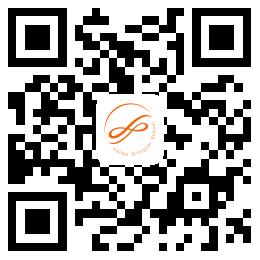
学校网站二维码
QR code of school website
学校公众号二维码
QR code of school official account